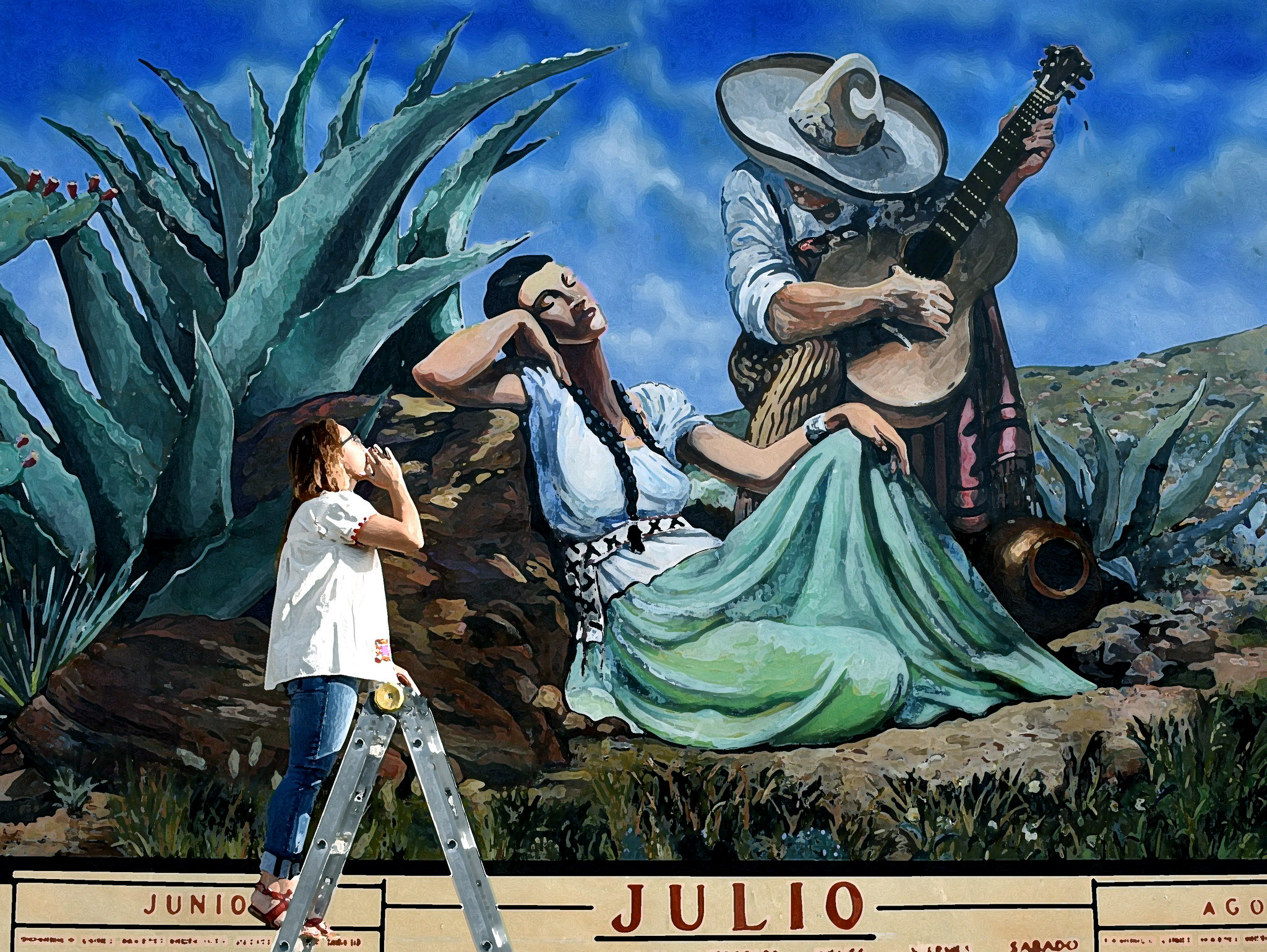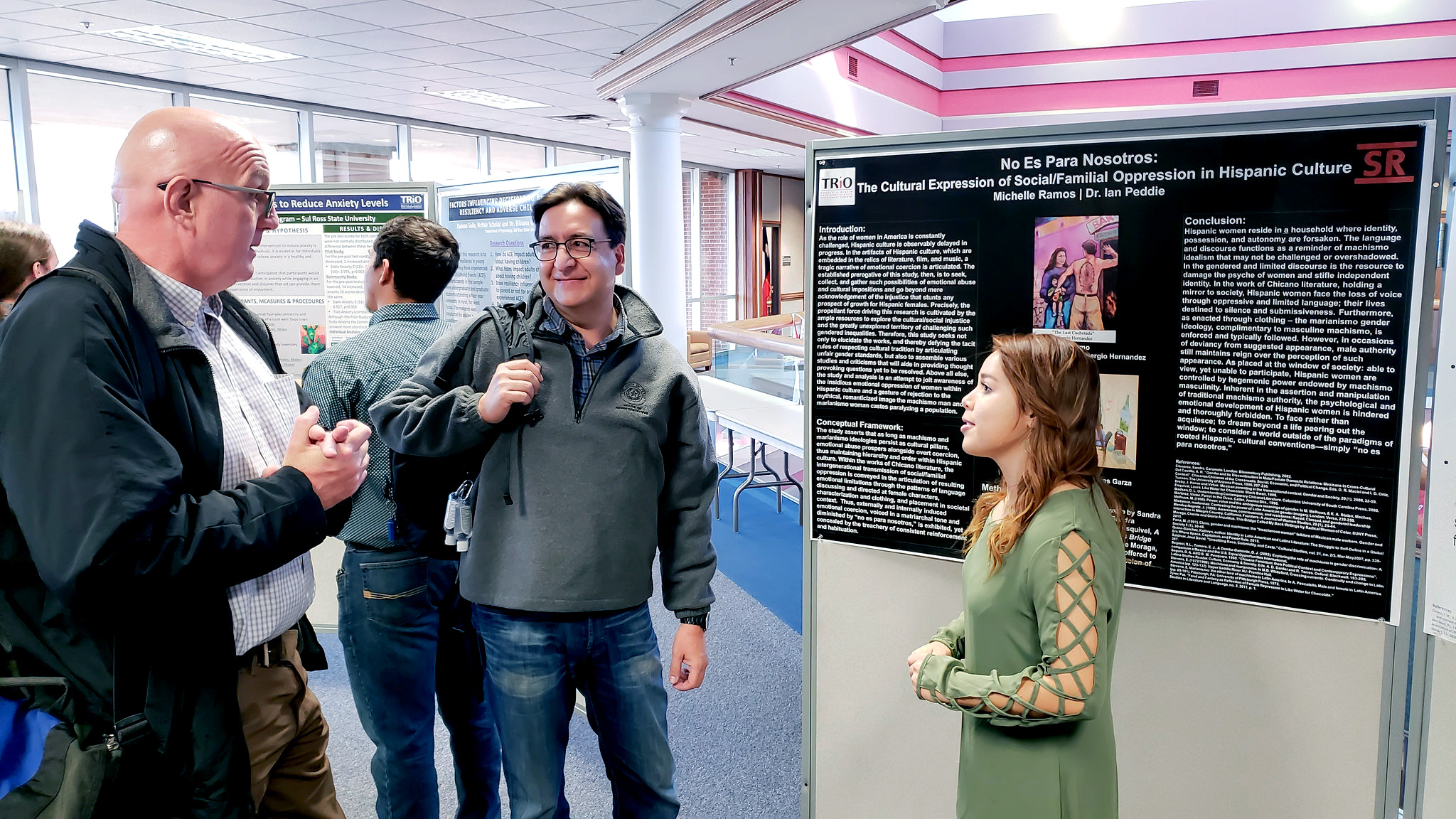
• by Michelle Ramos •
Editor’s note: In the following feature, Michelle discusses her undergraduate experiences, academic and professional aspirations, and her mentor’s own graduate educational experiences.
I am a senior English major at Sul Ross State University’s Alpine campus. Throughout my four years of college, I have enjoyed various learning experiences that have helped me grow as a student in my field and ignited the fire of my future aspirations. Thanks to the professors who have offered opportunities to develop as a reader, writer, literary critic, and researcher, I have discovered my desire to continue in this field and earn a PhD in English.
As I embarked on my college journey, I had originally sought to earn a teaching certification for high school English; however, as I mentioned, I was fortunate enough to have professors who assigned challenging work, encouraged critical thinking regarding course material, offered mentorship in an undergraduate research opportunity, allowed me to assist in their own research endeavors, provided answers and guidance when I was uncertain, and took a chance by letting me learn on the job as editor of the University’s Sage literary magazine. Through these invaluable learning experiences, I consider myself a beginning researcher, a hopeful literary critic, adolescent aesthete, and atavistic wanderer of literature.
Upon graduating, I will continue to attend Sul Ross State University as I work toward earning a master’s degree in English. Being the first in my family to pursue a master’s degree, I am both anxious and excited for the journey ahead. Meanwhile, I am fortifying my graduate school applications and studying for soaring scores on the GRE. I am hopeful I will be accepted into a doctoral program that will allow me to continue my academic pursuits and enable me to put my “foot in the door” as a teaching assistant. Of course, I am aware of the challenges that will come along with this path, as well as my naivete in much of this territory, but I am confident in the tools I have received and have learned to properly wield along my undergraduate voyage.
Although I did not necessarily plan to pursue a master’s degree at Sul Ross, I am convinced I was meant to continue learning from the very professors who inspired my aspirations for a profession beyond the high school classroom. I owe a significant amount of my academic growth to them and consider myself lucky to have another year alongside them. That being said, I am looking forward to the end of this semester as I stride my final stretch of undergraduate work, embrace the promise of completion, and discover the abundant challenges of my uncharted post-graduate life. With confidence, I can conclude that my undergraduate degree has been a vital determinant in who I am and who I aspire to be. I am forever indebted to Sul Ross and the faculty who have offered the resources to bridge the undergraduate and graduate treks and encourage me as I leap from one to the other.

Why study English?
Many people, including the average inquirer of my aspirations, assumes my career trajectory’s destination resides in the secondary English classroom; however, through this myriad of experiences deemed as my undergraduate journey, my interest in exploring literature and the accompanying criticisms has opened doors for challenging opportunities that not only inspired personal growth as a student but elevated my aspirations as well. My goal is to work in higher education as a professor of English using the literary criticism skills I gained as an English major, the research skills I have developed in my own undergraduate research and the multiple tasks entrusted to me as a research assistant for my mentor professor, and the writing skills essential to thrive in such literary and research settings. In my future career, I hope to explore epistemological questions fostered by cultural literature and investigate the ways in which various expressions and articulations from diverse backgrounds grapple with these same queries. Thus, I seek to further my education in English with a PhD in English focusing on comparative literature.
Coursework such as Cultural Society and Protest, Marxist Literature and Theory, English and American literatures, contemporary literature, and environmental literature will provide me with the skills of approach and understandings attending to differing representations of gender, race, socioeconomic class, political background, and sexuality inflected by literary narratives and accounts. Specifically, coursework in Cultural Society and Protest has inspired my interest in the correspondence of culture and protest and the role that such correspondence has played in the development, expressions, and portrayals of the zeitgeist of an era. In addition, my exposure to theory in regard to Marxist literature has become vital in my approaches of evaluating and analyzing literary pieces and understanding the multiple applications of a work. Along with other literary and cultural courses which I had the pleasure of taking, these classes have inspired profound critical thinking and change of perspective, consideration of how such writings and notions of critique and judgement offer ethical reflection on topics that extend beyond an inquiry into the status of the literature, and ultimately helped me determine my passion for literature across cultures.
Although my aspirations of a PhD in English provoke worry, and oftentimes doubt, I have become solely interested in my own reaction to the idea of such pursuit. I am aware of the formidable challenges that characterize this uncharted territory for me, but I am eager to go forth with my student, researcher, and professorial aspirations.

Profile of my mentor: Associate Professor of English Dr. Ian Peddie
Dr. Peddie is my mentor and major professor. He is the very person who has inspired me to consider my own graduate school pursuits.
For his graduate school, Dr. Peddie attended Illinois State University and the University of Rochester, where he earned his PhD. In his dissertation, Dr. Peddie explored the presence of a strong tradition of left-wing writing throughout the twentieth century. Along with researching Nelson Algren and Thomas McGrath, Dr. Peddie’s study investigates and raises important questions about the intersection between class identity and the development of American Literature in 1937. While in graduate school, Dr. Peddie worked hard, not only to achieve his goals but to acquire the means for doing so. His biggest challenge throughout school, he said, was money. As a matter of fact, money strains prevented him from attending his own graduation ceremony. However, he did not allow this challenge to halt his pursuit in the slightest. He worked his whole way through school and finished debt-free.
In ways more than one, Dr. Peddie’s journey through graduate school is inspirational as he was relentless in the pursuit of his goals. In fact, he attributes much of his success to his disciplined routine while attending school—a routine which still plays a big role in his day-to-day life. He learned quickly, while others struggled to learn, that “if you can impose discipline upon yourself” the end goal is much more attainable. His familiar routine includes rising early, reading the news in the morning, exercising, and working conscientiously at the tasks before him.
I also asked Dr. Peddie if he had advice for those desiring to attend graduate school and for those in the midst of it. The first advice he gave was to work hard. He stated that the willingness to work hard is what creates and distinguishes a successful student. For those interested in English literary studies, he suggested finding your voice—a discovery which will come as academic confidence builds over time. In addition, Dr. Peddie emphasized becoming comfortable with asking for help, having an informed opinion, and finding one’s own way.
“Be aware of dishonesty,” he advised. “Many people will say your work is sub-par when it is not. It’s also important to hold onto your values, and to never drop your standards.”
Alluding to the Latin phrase illegitimi non carborundum (don’t let others grind you down), Dr. Peddie concluded with a smile and offered further encouragement.
“You must be responsible and willing to do a lot of work. Don’t fall for laziness. You can do it.”
After having the pleasure of interviewing Dr. Peddie and learning about his own experiences, I often find myself contemplating my productivity and utilization of time. I have even began imposing a more disciplined routine on myself. His journey is equally inspirational and enlightening. I hope that, like Dr. Peddie, I can one day have my own success story to tell.